Functionalism, Social Constructionism, and Health in Australia Essay
VerifiedAdded on 2023/01/17
|8
|2483
|26
Essay
AI Summary
This essay examines the consequences of the biomedical model for understanding health and illness in Australia, utilizing functionalism and social constructionism. It begins by defining the social determinants of health (SDHs) and then explores the limitations of the biomedical model, which views health as a purely physiological phenomenon. The essay emphasizes the importance of considering social and cultural factors in health, discussing how SDHs like socioeconomic status, education, and environment impact health outcomes. It then analyzes the functionalist perspective, which views illness as a disruption to social order, and the social constructionist perspective, which highlights the socio-cultural construction of health and illness. The essay concludes that a comprehensive understanding of health requires integrating both biological and social perspectives, advocating for the biopsychosocial model and the improvement of SDHs to address health inequalities in Australia. The essay emphasizes the need for community health education and reduced stigmatization to promote overall well-being.
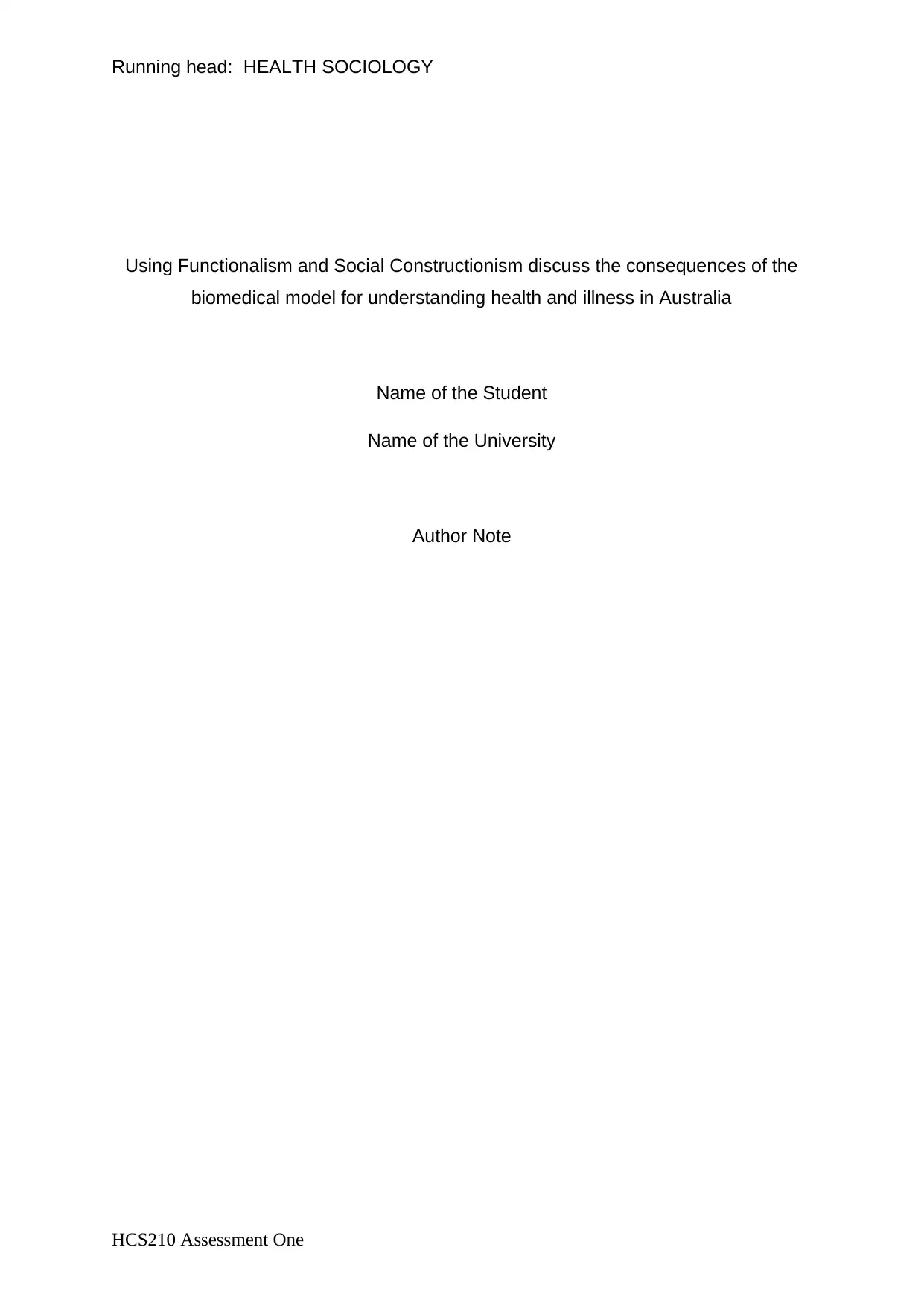
Running head: HEALTH SOCIOLOGY
Using Functionalism and Social Constructionism discuss the consequences of the
biomedical model for understanding health and illness in Australia
Name of the Student
Name of the University
Author Note
HCS210 Assessment One
Using Functionalism and Social Constructionism discuss the consequences of the
biomedical model for understanding health and illness in Australia
Name of the Student
Name of the University
Author Note
HCS210 Assessment One
Paraphrase This Document
Need a fresh take? Get an instant paraphrase of this document with our AI Paraphraser
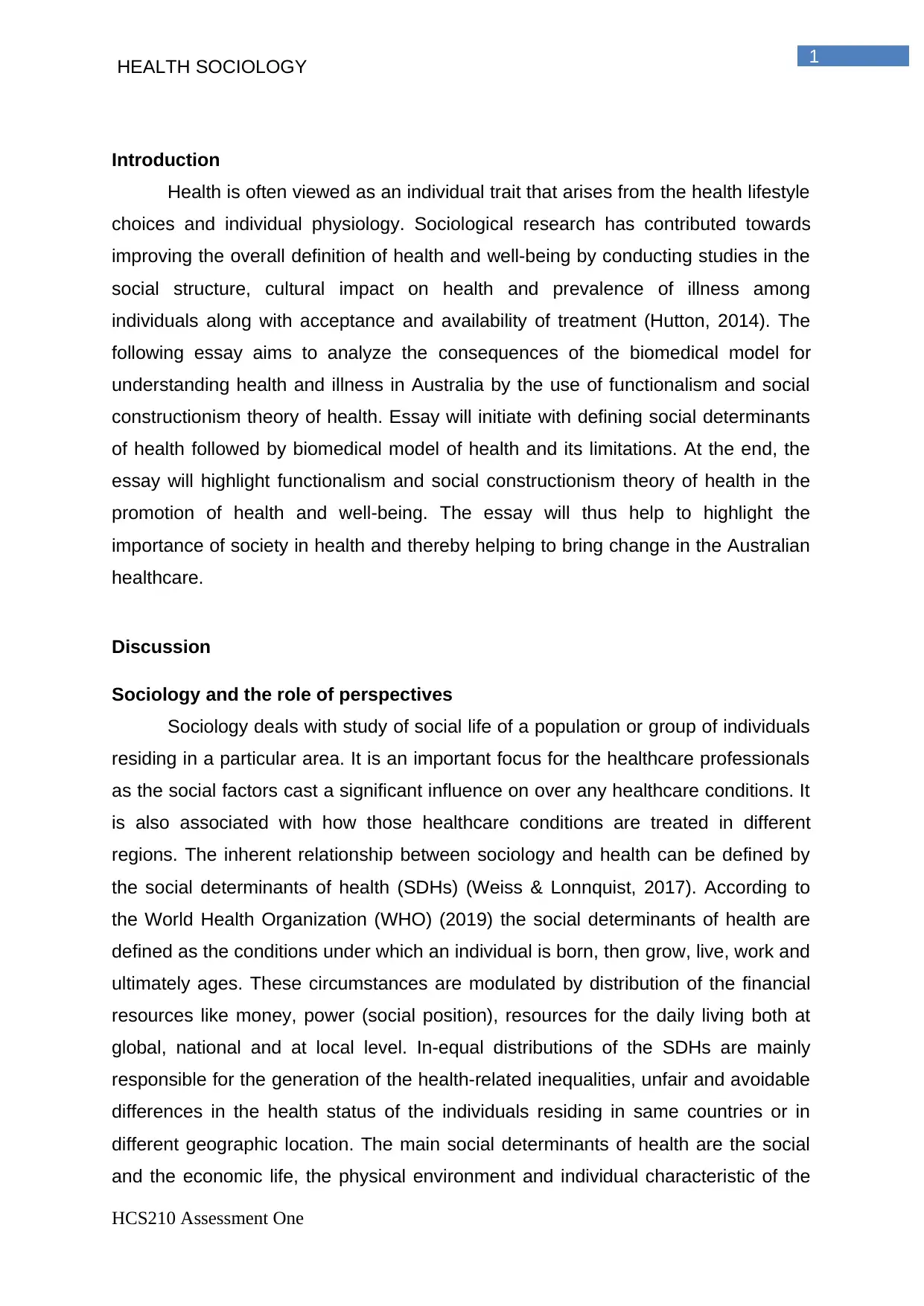
1
HEALTH SOCIOLOGY
Introduction
Health is often viewed as an individual trait that arises from the health lifestyle
choices and individual physiology. Sociological research has contributed towards
improving the overall definition of health and well-being by conducting studies in the
social structure, cultural impact on health and prevalence of illness among
individuals along with acceptance and availability of treatment (Hutton, 2014). The
following essay aims to analyze the consequences of the biomedical model for
understanding health and illness in Australia by the use of functionalism and social
constructionism theory of health. Essay will initiate with defining social determinants
of health followed by biomedical model of health and its limitations. At the end, the
essay will highlight functionalism and social constructionism theory of health in the
promotion of health and well-being. The essay will thus help to highlight the
importance of society in health and thereby helping to bring change in the Australian
healthcare.
Discussion
Sociology and the role of perspectives
Sociology deals with study of social life of a population or group of individuals
residing in a particular area. It is an important focus for the healthcare professionals
as the social factors cast a significant influence on over any healthcare conditions. It
is also associated with how those healthcare conditions are treated in different
regions. The inherent relationship between sociology and health can be defined by
the social determinants of health (SDHs) (Weiss & Lonnquist, 2017). According to
the World Health Organization (WHO) (2019) the social determinants of health are
defined as the conditions under which an individual is born, then grow, live, work and
ultimately ages. These circumstances are modulated by distribution of the financial
resources like money, power (social position), resources for the daily living both at
global, national and at local level. In-equal distributions of the SDHs are mainly
responsible for the generation of the health-related inequalities, unfair and avoidable
differences in the health status of the individuals residing in same countries or in
different geographic location. The main social determinants of health are the social
and the economic life, the physical environment and individual characteristic of the
HCS210 Assessment One
HEALTH SOCIOLOGY
Introduction
Health is often viewed as an individual trait that arises from the health lifestyle
choices and individual physiology. Sociological research has contributed towards
improving the overall definition of health and well-being by conducting studies in the
social structure, cultural impact on health and prevalence of illness among
individuals along with acceptance and availability of treatment (Hutton, 2014). The
following essay aims to analyze the consequences of the biomedical model for
understanding health and illness in Australia by the use of functionalism and social
constructionism theory of health. Essay will initiate with defining social determinants
of health followed by biomedical model of health and its limitations. At the end, the
essay will highlight functionalism and social constructionism theory of health in the
promotion of health and well-being. The essay will thus help to highlight the
importance of society in health and thereby helping to bring change in the Australian
healthcare.
Discussion
Sociology and the role of perspectives
Sociology deals with study of social life of a population or group of individuals
residing in a particular area. It is an important focus for the healthcare professionals
as the social factors cast a significant influence on over any healthcare conditions. It
is also associated with how those healthcare conditions are treated in different
regions. The inherent relationship between sociology and health can be defined by
the social determinants of health (SDHs) (Weiss & Lonnquist, 2017). According to
the World Health Organization (WHO) (2019) the social determinants of health are
defined as the conditions under which an individual is born, then grow, live, work and
ultimately ages. These circumstances are modulated by distribution of the financial
resources like money, power (social position), resources for the daily living both at
global, national and at local level. In-equal distributions of the SDHs are mainly
responsible for the generation of the health-related inequalities, unfair and avoidable
differences in the health status of the individuals residing in same countries or in
different geographic location. The main social determinants of health are the social
and the economic life, the physical environment and individual characteristic of the
HCS210 Assessment One
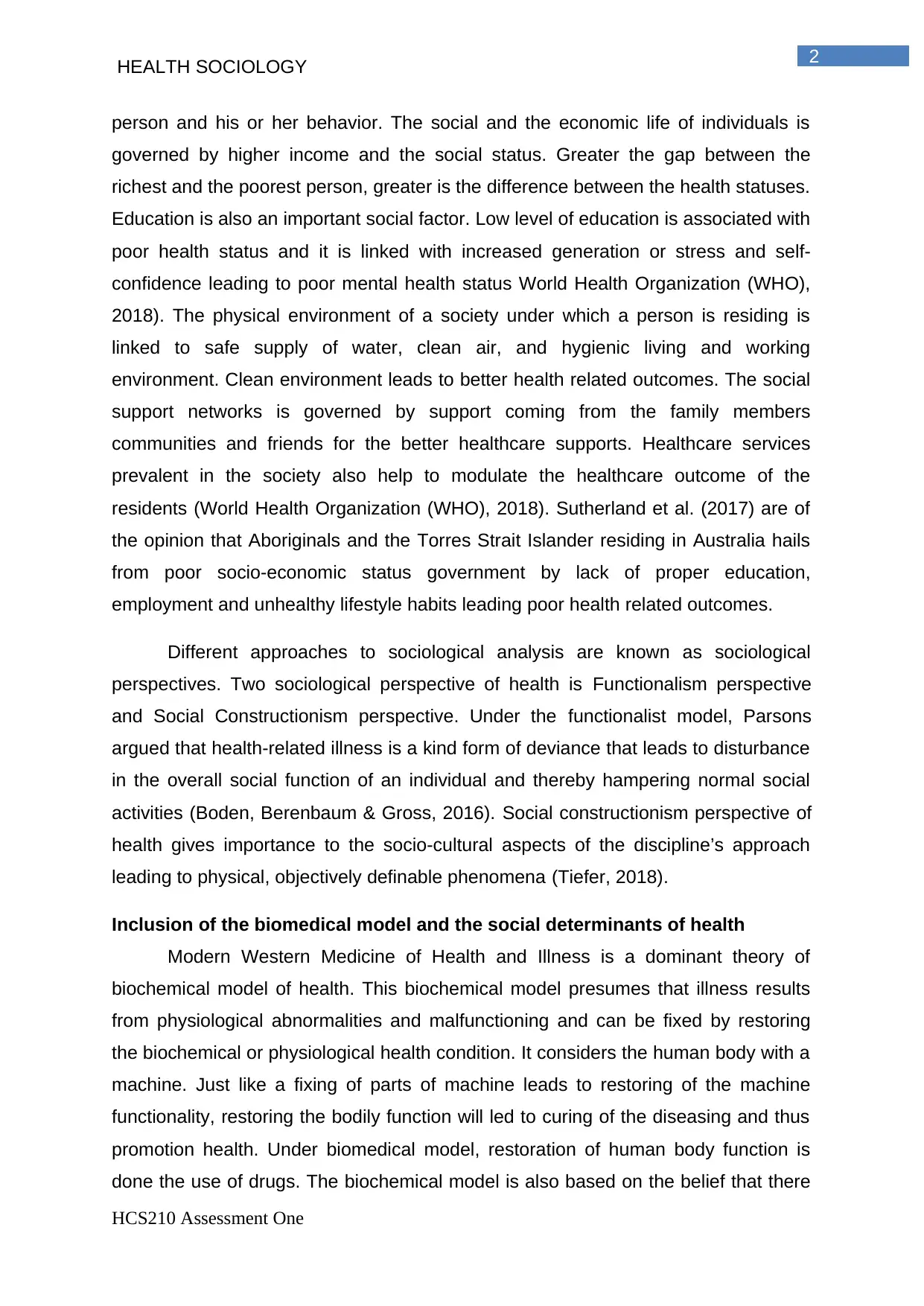
2
HEALTH SOCIOLOGY
person and his or her behavior. The social and the economic life of individuals is
governed by higher income and the social status. Greater the gap between the
richest and the poorest person, greater is the difference between the health statuses.
Education is also an important social factor. Low level of education is associated with
poor health status and it is linked with increased generation or stress and self-
confidence leading to poor mental health status World Health Organization (WHO),
2018). The physical environment of a society under which a person is residing is
linked to safe supply of water, clean air, and hygienic living and working
environment. Clean environment leads to better health related outcomes. The social
support networks is governed by support coming from the family members
communities and friends for the better healthcare supports. Healthcare services
prevalent in the society also help to modulate the healthcare outcome of the
residents (World Health Organization (WHO), 2018). Sutherland et al. (2017) are of
the opinion that Aboriginals and the Torres Strait Islander residing in Australia hails
from poor socio-economic status government by lack of proper education,
employment and unhealthy lifestyle habits leading poor health related outcomes.
Different approaches to sociological analysis are known as sociological
perspectives. Two sociological perspective of health is Functionalism perspective
and Social Constructionism perspective. Under the functionalist model, Parsons
argued that health-related illness is a kind form of deviance that leads to disturbance
in the overall social function of an individual and thereby hampering normal social
activities (Boden, Berenbaum & Gross, 2016). Social constructionism perspective of
health gives importance to the socio-cultural aspects of the discipline’s approach
leading to physical, objectively definable phenomena (Tiefer, 2018).
Inclusion of the biomedical model and the social determinants of health
Modern Western Medicine of Health and Illness is a dominant theory of
biochemical model of health. This biochemical model presumes that illness results
from physiological abnormalities and malfunctioning and can be fixed by restoring
the biochemical or physiological health condition. It considers the human body with a
machine. Just like a fixing of parts of machine leads to restoring of the machine
functionality, restoring the bodily function will led to curing of the diseasing and thus
promotion health. Under biomedical model, restoration of human body function is
done the use of drugs. The biochemical model is also based on the belief that there
HCS210 Assessment One
HEALTH SOCIOLOGY
person and his or her behavior. The social and the economic life of individuals is
governed by higher income and the social status. Greater the gap between the
richest and the poorest person, greater is the difference between the health statuses.
Education is also an important social factor. Low level of education is associated with
poor health status and it is linked with increased generation or stress and self-
confidence leading to poor mental health status World Health Organization (WHO),
2018). The physical environment of a society under which a person is residing is
linked to safe supply of water, clean air, and hygienic living and working
environment. Clean environment leads to better health related outcomes. The social
support networks is governed by support coming from the family members
communities and friends for the better healthcare supports. Healthcare services
prevalent in the society also help to modulate the healthcare outcome of the
residents (World Health Organization (WHO), 2018). Sutherland et al. (2017) are of
the opinion that Aboriginals and the Torres Strait Islander residing in Australia hails
from poor socio-economic status government by lack of proper education,
employment and unhealthy lifestyle habits leading poor health related outcomes.
Different approaches to sociological analysis are known as sociological
perspectives. Two sociological perspective of health is Functionalism perspective
and Social Constructionism perspective. Under the functionalist model, Parsons
argued that health-related illness is a kind form of deviance that leads to disturbance
in the overall social function of an individual and thereby hampering normal social
activities (Boden, Berenbaum & Gross, 2016). Social constructionism perspective of
health gives importance to the socio-cultural aspects of the discipline’s approach
leading to physical, objectively definable phenomena (Tiefer, 2018).
Inclusion of the biomedical model and the social determinants of health
Modern Western Medicine of Health and Illness is a dominant theory of
biochemical model of health. This biochemical model presumes that illness results
from physiological abnormalities and malfunctioning and can be fixed by restoring
the biochemical or physiological health condition. It considers the human body with a
machine. Just like a fixing of parts of machine leads to restoring of the machine
functionality, restoring the bodily function will led to curing of the diseasing and thus
promotion health. Under biomedical model, restoration of human body function is
done the use of drugs. The biochemical model is also based on the belief that there
HCS210 Assessment One
⊘ This is a preview!⊘
Do you want full access?
Subscribe today to unlock all pages.

Trusted by 1+ million students worldwide
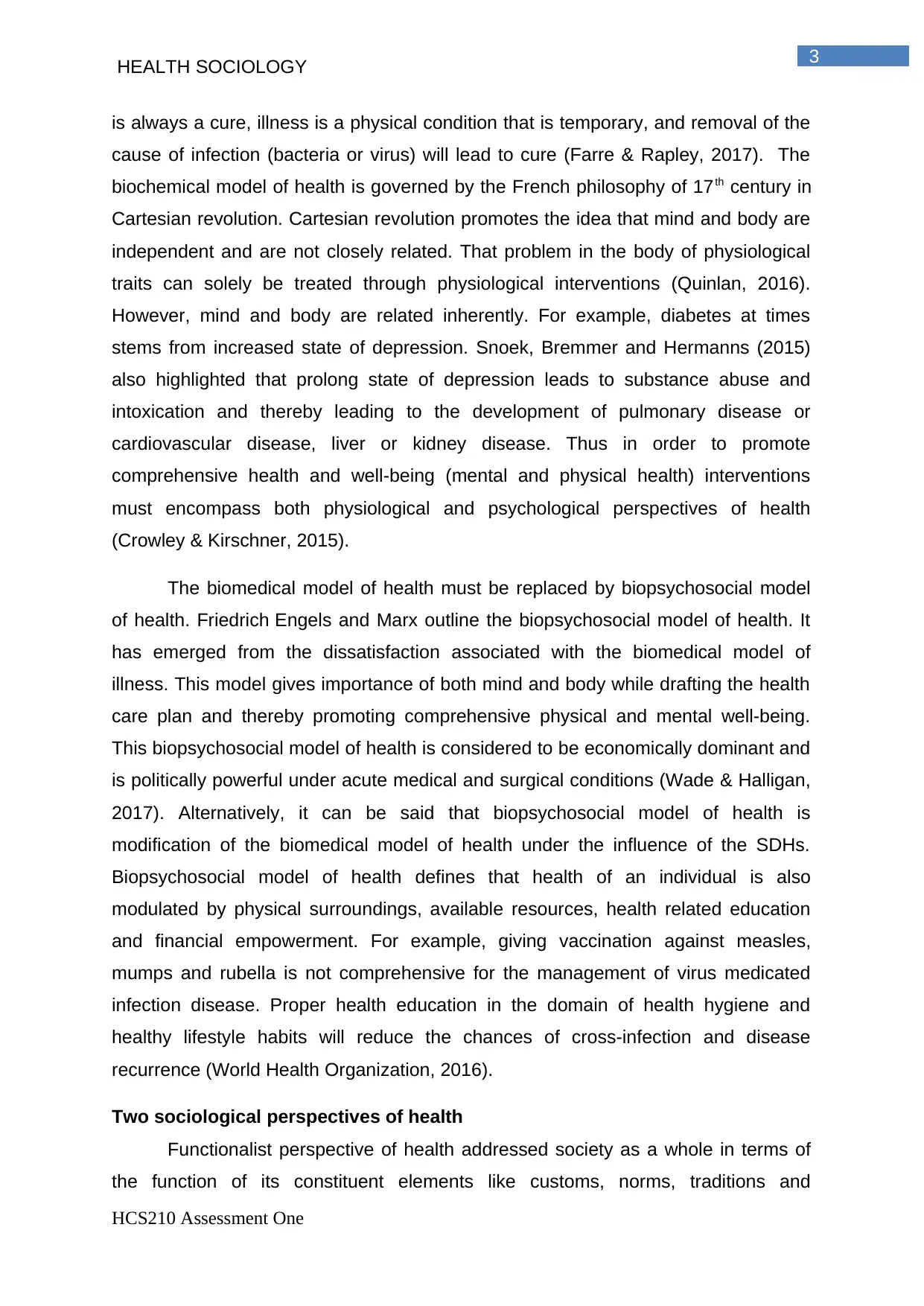
3
HEALTH SOCIOLOGY
is always a cure, illness is a physical condition that is temporary, and removal of the
cause of infection (bacteria or virus) will lead to cure (Farre & Rapley, 2017). The
biochemical model of health is governed by the French philosophy of 17th century in
Cartesian revolution. Cartesian revolution promotes the idea that mind and body are
independent and are not closely related. That problem in the body of physiological
traits can solely be treated through physiological interventions (Quinlan, 2016).
However, mind and body are related inherently. For example, diabetes at times
stems from increased state of depression. Snoek, Bremmer and Hermanns (2015)
also highlighted that prolong state of depression leads to substance abuse and
intoxication and thereby leading to the development of pulmonary disease or
cardiovascular disease, liver or kidney disease. Thus in order to promote
comprehensive health and well-being (mental and physical health) interventions
must encompass both physiological and psychological perspectives of health
(Crowley & Kirschner, 2015).
The biomedical model of health must be replaced by biopsychosocial model
of health. Friedrich Engels and Marx outline the biopsychosocial model of health. It
has emerged from the dissatisfaction associated with the biomedical model of
illness. This model gives importance of both mind and body while drafting the health
care plan and thereby promoting comprehensive physical and mental well-being.
This biopsychosocial model of health is considered to be economically dominant and
is politically powerful under acute medical and surgical conditions (Wade & Halligan,
2017). Alternatively, it can be said that biopsychosocial model of health is
modification of the biomedical model of health under the influence of the SDHs.
Biopsychosocial model of health defines that health of an individual is also
modulated by physical surroundings, available resources, health related education
and financial empowerment. For example, giving vaccination against measles,
mumps and rubella is not comprehensive for the management of virus medicated
infection disease. Proper health education in the domain of health hygiene and
healthy lifestyle habits will reduce the chances of cross-infection and disease
recurrence (World Health Organization, 2016).
Two sociological perspectives of health
Functionalist perspective of health addressed society as a whole in terms of
the function of its constituent elements like customs, norms, traditions and
HCS210 Assessment One
HEALTH SOCIOLOGY
is always a cure, illness is a physical condition that is temporary, and removal of the
cause of infection (bacteria or virus) will lead to cure (Farre & Rapley, 2017). The
biochemical model of health is governed by the French philosophy of 17th century in
Cartesian revolution. Cartesian revolution promotes the idea that mind and body are
independent and are not closely related. That problem in the body of physiological
traits can solely be treated through physiological interventions (Quinlan, 2016).
However, mind and body are related inherently. For example, diabetes at times
stems from increased state of depression. Snoek, Bremmer and Hermanns (2015)
also highlighted that prolong state of depression leads to substance abuse and
intoxication and thereby leading to the development of pulmonary disease or
cardiovascular disease, liver or kidney disease. Thus in order to promote
comprehensive health and well-being (mental and physical health) interventions
must encompass both physiological and psychological perspectives of health
(Crowley & Kirschner, 2015).
The biomedical model of health must be replaced by biopsychosocial model
of health. Friedrich Engels and Marx outline the biopsychosocial model of health. It
has emerged from the dissatisfaction associated with the biomedical model of
illness. This model gives importance of both mind and body while drafting the health
care plan and thereby promoting comprehensive physical and mental well-being.
This biopsychosocial model of health is considered to be economically dominant and
is politically powerful under acute medical and surgical conditions (Wade & Halligan,
2017). Alternatively, it can be said that biopsychosocial model of health is
modification of the biomedical model of health under the influence of the SDHs.
Biopsychosocial model of health defines that health of an individual is also
modulated by physical surroundings, available resources, health related education
and financial empowerment. For example, giving vaccination against measles,
mumps and rubella is not comprehensive for the management of virus medicated
infection disease. Proper health education in the domain of health hygiene and
healthy lifestyle habits will reduce the chances of cross-infection and disease
recurrence (World Health Organization, 2016).
Two sociological perspectives of health
Functionalist perspective of health addressed society as a whole in terms of
the function of its constituent elements like customs, norms, traditions and
HCS210 Assessment One
Paraphrase This Document
Need a fresh take? Get an instant paraphrase of this document with our AI Paraphraser
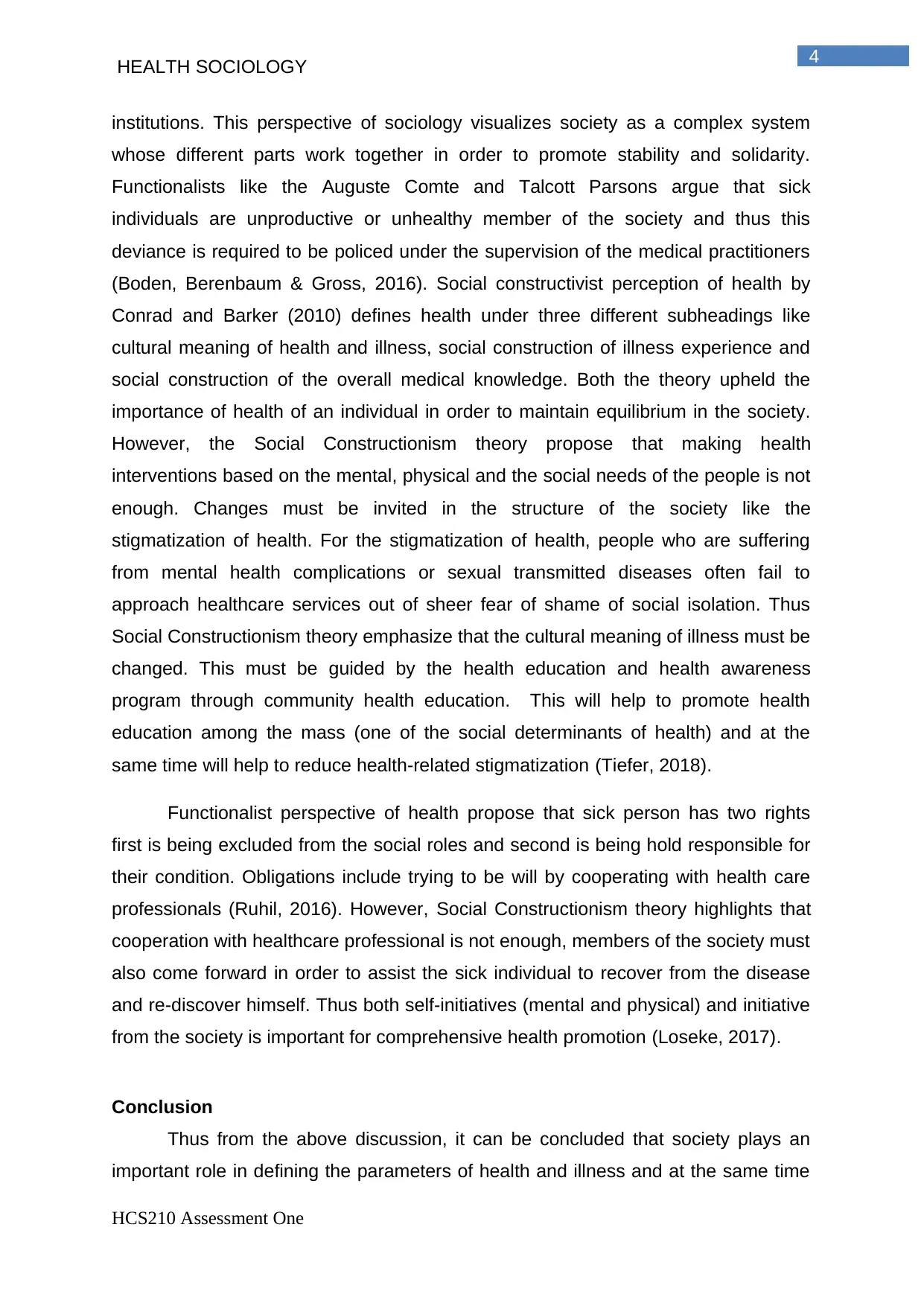
4
HEALTH SOCIOLOGY
institutions. This perspective of sociology visualizes society as a complex system
whose different parts work together in order to promote stability and solidarity.
Functionalists like the Auguste Comte and Talcott Parsons argue that sick
individuals are unproductive or unhealthy member of the society and thus this
deviance is required to be policed under the supervision of the medical practitioners
(Boden, Berenbaum & Gross, 2016). Social constructivist perception of health by
Conrad and Barker (2010) defines health under three different subheadings like
cultural meaning of health and illness, social construction of illness experience and
social construction of the overall medical knowledge. Both the theory upheld the
importance of health of an individual in order to maintain equilibrium in the society.
However, the Social Constructionism theory propose that making health
interventions based on the mental, physical and the social needs of the people is not
enough. Changes must be invited in the structure of the society like the
stigmatization of health. For the stigmatization of health, people who are suffering
from mental health complications or sexual transmitted diseases often fail to
approach healthcare services out of sheer fear of shame of social isolation. Thus
Social Constructionism theory emphasize that the cultural meaning of illness must be
changed. This must be guided by the health education and health awareness
program through community health education. This will help to promote health
education among the mass (one of the social determinants of health) and at the
same time will help to reduce health-related stigmatization (Tiefer, 2018).
Functionalist perspective of health propose that sick person has two rights
first is being excluded from the social roles and second is being hold responsible for
their condition. Obligations include trying to be will by cooperating with health care
professionals (Ruhil, 2016). However, Social Constructionism theory highlights that
cooperation with healthcare professional is not enough, members of the society must
also come forward in order to assist the sick individual to recover from the disease
and re-discover himself. Thus both self-initiatives (mental and physical) and initiative
from the society is important for comprehensive health promotion (Loseke, 2017).
Conclusion
Thus from the above discussion, it can be concluded that society plays an
important role in defining the parameters of health and illness and at the same time
HCS210 Assessment One
HEALTH SOCIOLOGY
institutions. This perspective of sociology visualizes society as a complex system
whose different parts work together in order to promote stability and solidarity.
Functionalists like the Auguste Comte and Talcott Parsons argue that sick
individuals are unproductive or unhealthy member of the society and thus this
deviance is required to be policed under the supervision of the medical practitioners
(Boden, Berenbaum & Gross, 2016). Social constructivist perception of health by
Conrad and Barker (2010) defines health under three different subheadings like
cultural meaning of health and illness, social construction of illness experience and
social construction of the overall medical knowledge. Both the theory upheld the
importance of health of an individual in order to maintain equilibrium in the society.
However, the Social Constructionism theory propose that making health
interventions based on the mental, physical and the social needs of the people is not
enough. Changes must be invited in the structure of the society like the
stigmatization of health. For the stigmatization of health, people who are suffering
from mental health complications or sexual transmitted diseases often fail to
approach healthcare services out of sheer fear of shame of social isolation. Thus
Social Constructionism theory emphasize that the cultural meaning of illness must be
changed. This must be guided by the health education and health awareness
program through community health education. This will help to promote health
education among the mass (one of the social determinants of health) and at the
same time will help to reduce health-related stigmatization (Tiefer, 2018).
Functionalist perspective of health propose that sick person has two rights
first is being excluded from the social roles and second is being hold responsible for
their condition. Obligations include trying to be will by cooperating with health care
professionals (Ruhil, 2016). However, Social Constructionism theory highlights that
cooperation with healthcare professional is not enough, members of the society must
also come forward in order to assist the sick individual to recover from the disease
and re-discover himself. Thus both self-initiatives (mental and physical) and initiative
from the society is important for comprehensive health promotion (Loseke, 2017).
Conclusion
Thus from the above discussion, it can be concluded that society plays an
important role in defining the parameters of health and illness and at the same time
HCS210 Assessment One
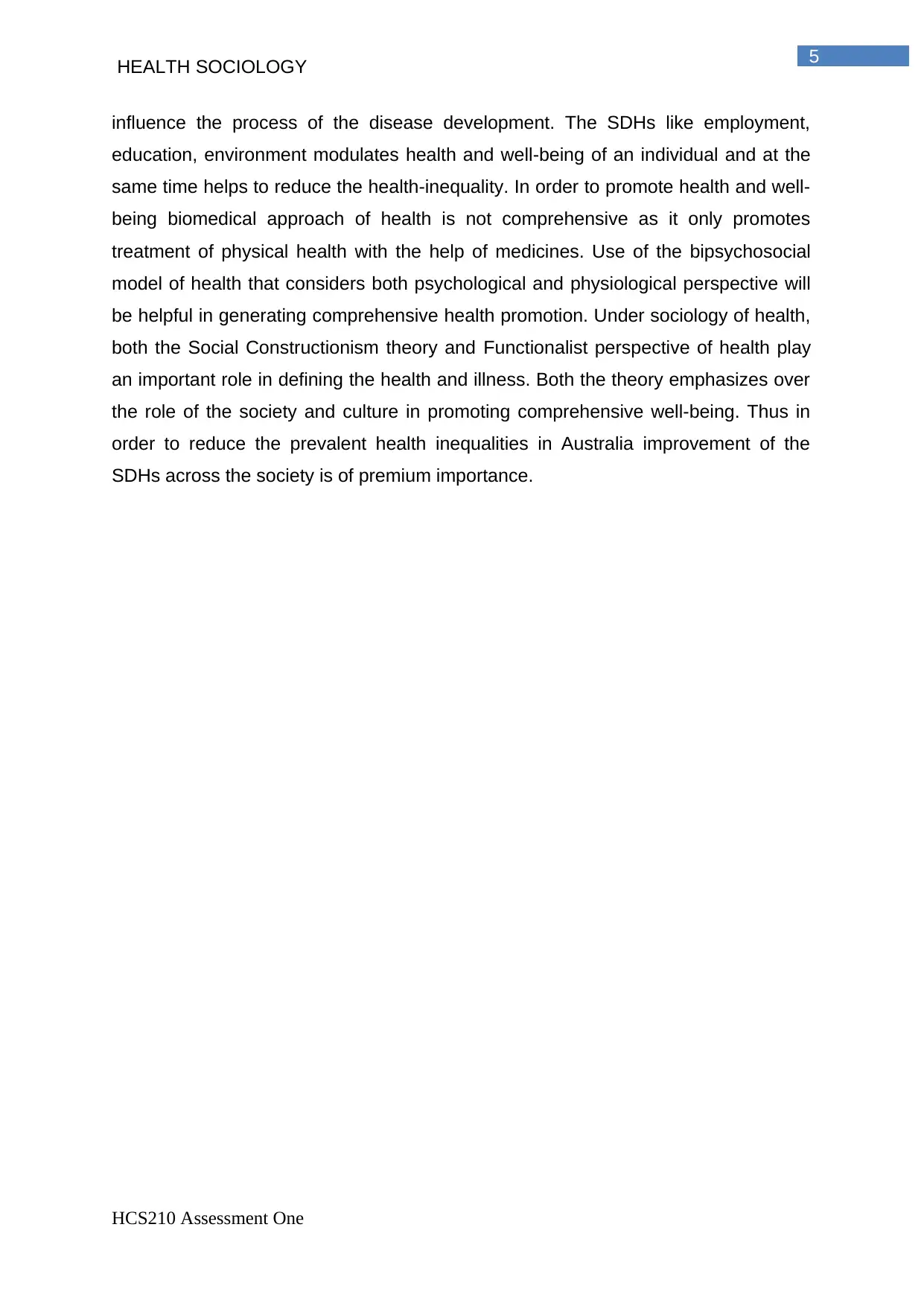
5
HEALTH SOCIOLOGY
influence the process of the disease development. The SDHs like employment,
education, environment modulates health and well-being of an individual and at the
same time helps to reduce the health-inequality. In order to promote health and well-
being biomedical approach of health is not comprehensive as it only promotes
treatment of physical health with the help of medicines. Use of the bipsychosocial
model of health that considers both psychological and physiological perspective will
be helpful in generating comprehensive health promotion. Under sociology of health,
both the Social Constructionism theory and Functionalist perspective of health play
an important role in defining the health and illness. Both the theory emphasizes over
the role of the society and culture in promoting comprehensive well-being. Thus in
order to reduce the prevalent health inequalities in Australia improvement of the
SDHs across the society is of premium importance.
HCS210 Assessment One
HEALTH SOCIOLOGY
influence the process of the disease development. The SDHs like employment,
education, environment modulates health and well-being of an individual and at the
same time helps to reduce the health-inequality. In order to promote health and well-
being biomedical approach of health is not comprehensive as it only promotes
treatment of physical health with the help of medicines. Use of the bipsychosocial
model of health that considers both psychological and physiological perspective will
be helpful in generating comprehensive health promotion. Under sociology of health,
both the Social Constructionism theory and Functionalist perspective of health play
an important role in defining the health and illness. Both the theory emphasizes over
the role of the society and culture in promoting comprehensive well-being. Thus in
order to reduce the prevalent health inequalities in Australia improvement of the
SDHs across the society is of premium importance.
HCS210 Assessment One
⊘ This is a preview!⊘
Do you want full access?
Subscribe today to unlock all pages.

Trusted by 1+ million students worldwide
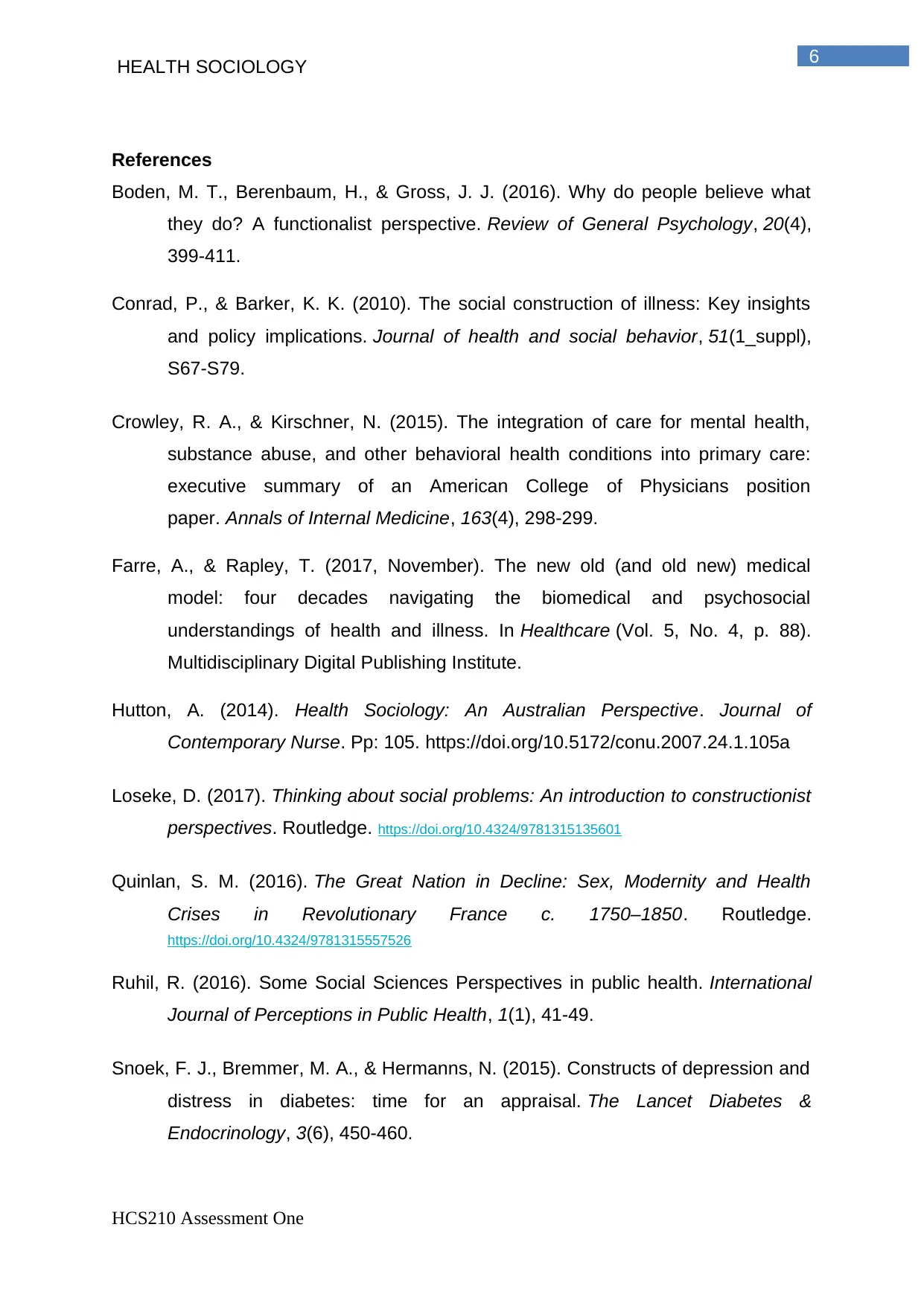
6
HEALTH SOCIOLOGY
References
Boden, M. T., Berenbaum, H., & Gross, J. J. (2016). Why do people believe what
they do? A functionalist perspective. Review of General Psychology, 20(4),
399-411.
Conrad, P., & Barker, K. K. (2010). The social construction of illness: Key insights
and policy implications. Journal of health and social behavior, 51(1_suppl),
S67-S79.
Crowley, R. A., & Kirschner, N. (2015). The integration of care for mental health,
substance abuse, and other behavioral health conditions into primary care:
executive summary of an American College of Physicians position
paper. Annals of Internal Medicine, 163(4), 298-299.
Farre, A., & Rapley, T. (2017, November). The new old (and old new) medical
model: four decades navigating the biomedical and psychosocial
understandings of health and illness. In Healthcare (Vol. 5, No. 4, p. 88).
Multidisciplinary Digital Publishing Institute.
Hutton, A. (2014). Health Sociology: An Australian Perspective. Journal of
Contemporary Nurse. Pp: 105. https://doi.org/10.5172/conu.2007.24.1.105a
Loseke, D. (2017). Thinking about social problems: An introduction to constructionist
perspectives. Routledge. https://doi.org/10.4324/9781315135601
Quinlan, S. M. (2016). The Great Nation in Decline: Sex, Modernity and Health
Crises in Revolutionary France c. 1750–1850. Routledge.
https://doi.org/10.4324/9781315557526
Ruhil, R. (2016). Some Social Sciences Perspectives in public health. International
Journal of Perceptions in Public Health, 1(1), 41-49.
Snoek, F. J., Bremmer, M. A., & Hermanns, N. (2015). Constructs of depression and
distress in diabetes: time for an appraisal. The Lancet Diabetes &
Endocrinology, 3(6), 450-460.
HCS210 Assessment One
HEALTH SOCIOLOGY
References
Boden, M. T., Berenbaum, H., & Gross, J. J. (2016). Why do people believe what
they do? A functionalist perspective. Review of General Psychology, 20(4),
399-411.
Conrad, P., & Barker, K. K. (2010). The social construction of illness: Key insights
and policy implications. Journal of health and social behavior, 51(1_suppl),
S67-S79.
Crowley, R. A., & Kirschner, N. (2015). The integration of care for mental health,
substance abuse, and other behavioral health conditions into primary care:
executive summary of an American College of Physicians position
paper. Annals of Internal Medicine, 163(4), 298-299.
Farre, A., & Rapley, T. (2017, November). The new old (and old new) medical
model: four decades navigating the biomedical and psychosocial
understandings of health and illness. In Healthcare (Vol. 5, No. 4, p. 88).
Multidisciplinary Digital Publishing Institute.
Hutton, A. (2014). Health Sociology: An Australian Perspective. Journal of
Contemporary Nurse. Pp: 105. https://doi.org/10.5172/conu.2007.24.1.105a
Loseke, D. (2017). Thinking about social problems: An introduction to constructionist
perspectives. Routledge. https://doi.org/10.4324/9781315135601
Quinlan, S. M. (2016). The Great Nation in Decline: Sex, Modernity and Health
Crises in Revolutionary France c. 1750–1850. Routledge.
https://doi.org/10.4324/9781315557526
Ruhil, R. (2016). Some Social Sciences Perspectives in public health. International
Journal of Perceptions in Public Health, 1(1), 41-49.
Snoek, F. J., Bremmer, M. A., & Hermanns, N. (2015). Constructs of depression and
distress in diabetes: time for an appraisal. The Lancet Diabetes &
Endocrinology, 3(6), 450-460.
HCS210 Assessment One
Paraphrase This Document
Need a fresh take? Get an instant paraphrase of this document with our AI Paraphraser
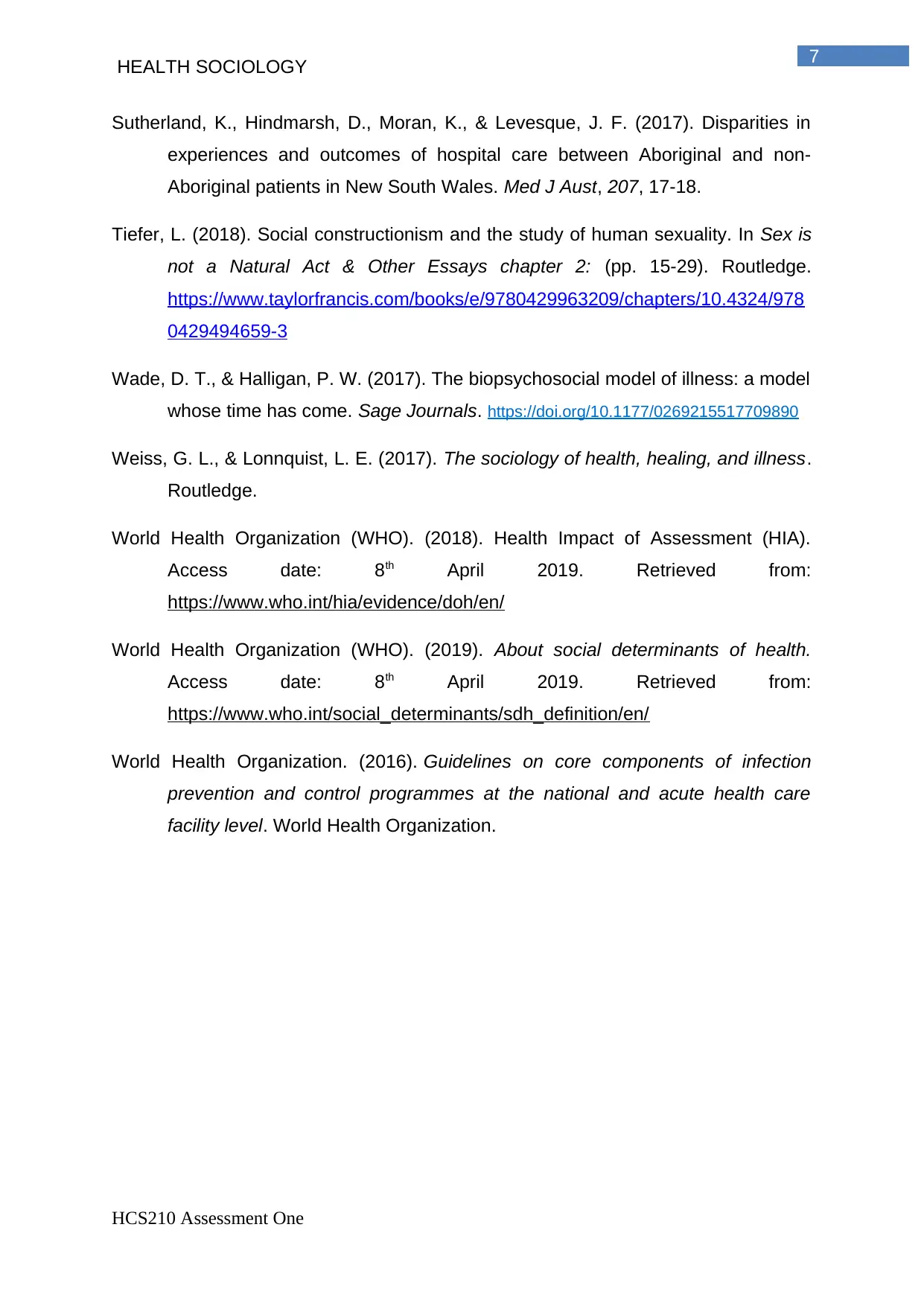
7
HEALTH SOCIOLOGY
Sutherland, K., Hindmarsh, D., Moran, K., & Levesque, J. F. (2017). Disparities in
experiences and outcomes of hospital care between Aboriginal and non-
Aboriginal patients in New South Wales. Med J Aust, 207, 17-18.
Tiefer, L. (2018). Social constructionism and the study of human sexuality. In Sex is
not a Natural Act & Other Essays chapter 2: (pp. 15-29). Routledge.
https://www.taylorfrancis.com/books/e/9780429963209/chapters/10.4324/978
0429494659-3
Wade, D. T., & Halligan, P. W. (2017). The biopsychosocial model of illness: a model
whose time has come. Sage Journals. https://doi.org/10.1177/0269215517709890
Weiss, G. L., & Lonnquist, L. E. (2017). The sociology of health, healing, and illness.
Routledge.
World Health Organization (WHO). (2018). Health Impact of Assessment (HIA).
Access date: 8th April 2019. Retrieved from:
https://www.who.int/hia/evidence/doh/en/
World Health Organization (WHO). (2019). About social determinants of health.
Access date: 8th April 2019. Retrieved from:
https://www.who.int/social_determinants/sdh_definition/en/
World Health Organization. (2016). Guidelines on core components of infection
prevention and control programmes at the national and acute health care
facility level. World Health Organization.
HCS210 Assessment One
HEALTH SOCIOLOGY
Sutherland, K., Hindmarsh, D., Moran, K., & Levesque, J. F. (2017). Disparities in
experiences and outcomes of hospital care between Aboriginal and non-
Aboriginal patients in New South Wales. Med J Aust, 207, 17-18.
Tiefer, L. (2018). Social constructionism and the study of human sexuality. In Sex is
not a Natural Act & Other Essays chapter 2: (pp. 15-29). Routledge.
https://www.taylorfrancis.com/books/e/9780429963209/chapters/10.4324/978
0429494659-3
Wade, D. T., & Halligan, P. W. (2017). The biopsychosocial model of illness: a model
whose time has come. Sage Journals. https://doi.org/10.1177/0269215517709890
Weiss, G. L., & Lonnquist, L. E. (2017). The sociology of health, healing, and illness.
Routledge.
World Health Organization (WHO). (2018). Health Impact of Assessment (HIA).
Access date: 8th April 2019. Retrieved from:
https://www.who.int/hia/evidence/doh/en/
World Health Organization (WHO). (2019). About social determinants of health.
Access date: 8th April 2019. Retrieved from:
https://www.who.int/social_determinants/sdh_definition/en/
World Health Organization. (2016). Guidelines on core components of infection
prevention and control programmes at the national and acute health care
facility level. World Health Organization.
HCS210 Assessment One
1 out of 8
Related Documents
Your All-in-One AI-Powered Toolkit for Academic Success.
+13062052269
info@desklib.com
Available 24*7 on WhatsApp / Email
![[object Object]](/_next/static/media/star-bottom.7253800d.svg)
Unlock your academic potential
Copyright © 2020–2026 A2Z Services. All Rights Reserved. Developed and managed by ZUCOL.





